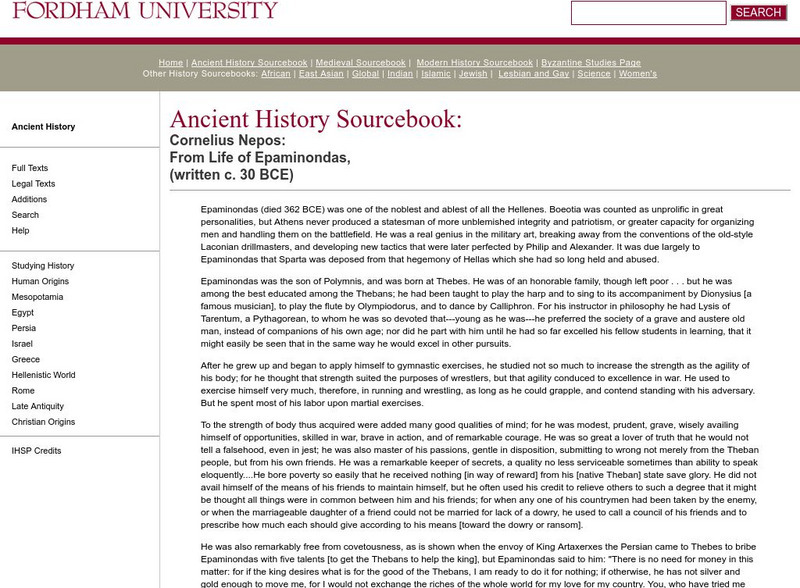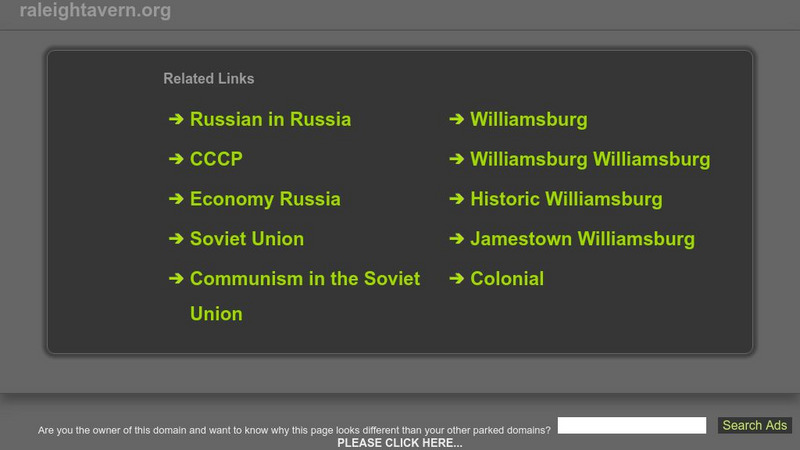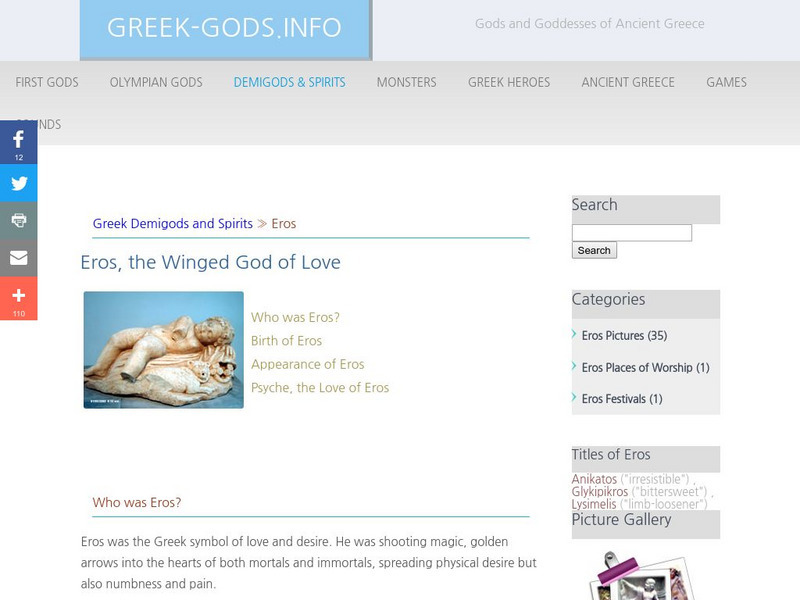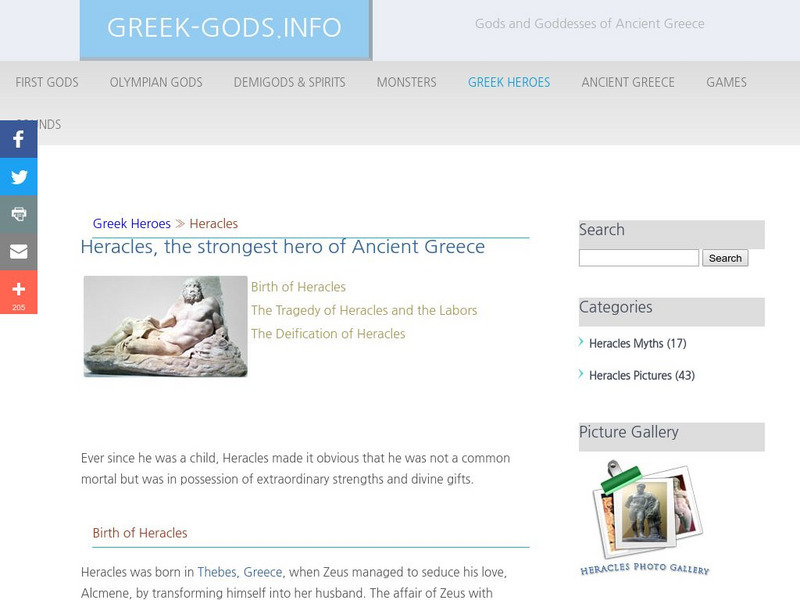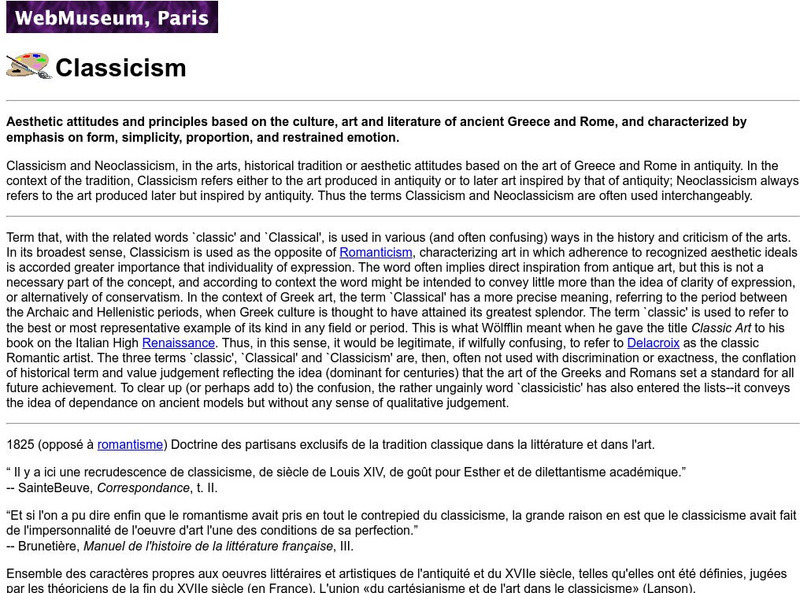Hi, what do you want to do?
Internet History Sourcebooks Project
Fordham University: Ancient History Sourcebook: Cornelius Nepos Life of Epaminondas
A biographical sketch by 1st century B.C. Roman author, Cornelius Nepos, of the Theban statesman and military leader, Epaminondas. Epaminondas lived at the beginning of the 4th century B.C. The author stresses Epaminondas's strength of...
University of Illinois
University of Illinois Urbana Champaign: Krannert Art Museum and Kinkead Pavilion: Collections
The Krannert Art Museum provides a great collection of artwork from all over the world. Click on "collections" to access images of African, Egyptian, America-Pre-Columbian, USA, Ancient Gandhara, China, India, Japan, Thailand, Greece,...
Other
"A Well Trimmed Ship", the Republican Legacy of Polybius
A two-part paper, the first of which is a biography of Polybius, a Greek, who wrote a history of the Roman Republic. The second part discusses his work and his admiration of Roman virtues and the government of the Roman Republic.
Other
Women in World History Curriculum: Female Fury in the Forum
This lesson uses two examples of women asserting their power in Roman history to show what rights they really had. Activities are discussion based but could be easily expanded upon.
Greek Gods
Greek Gods: Demigods & Spirits: Eros
Eros (Cupid), the winged god of Love in Ancient Greece, shot golden arrows into the hearts of both humans and gods.
Khan Academy
Khan Academy: Bronze Head From a Statue of the Emperor Hadrian
Hadrian (reigned 117-138 C.E.), once a tribune in three different legions of the Roman army and commander of a legion in one of Trajan's wars, was often shown in military uniform. He was clearly keen to project the image of an ever-ready...
Famous Scientists
Famous Scientists: Galen
Learn about the man whose medical doctrine dominated the Western and Arab worlds for close to 1500 years.
Bartleby
Bartleby.com: Bulfinch's Mythology: Bacchus
The history of the god Bacchus, the god of wine, includes the perilous circumstances of his birth and the foundation of his devotions, the Bacchanal.
Other
Macedonian Heritage
Macedonian Heritage offers an extensive look at the history, affairs, and culture of Macedonia. You can see timelines, documents, and look at maps of the area.
Ducksters
Ducksters: Greece History and Timeline Overview
Kids learn about the history and timeline of the country of Greece including ancient Greece, Athens, Sparta, democracy, Alexander the Great, Roman rule, the Ottoman Empire, independence, and current events.
A&E Television
History.com: Tailgating: How the Pre Game Tradition Can Be Traced to Ancient Times
The ritual grew as ownership of automobiles and then mass production of portable grills and plastic coolers soared. Tailgating before college and professional football games is an American tradition. Temporary tent cities pop up in...
Other
The State Hermitage Museum, St. Petersburg, Russia
The Hermitage is home to vast collections of art and artifacts dating from paleolithic times and continuing forward into the present day. With a variety of search capabilities, zoom and panoramic features, analytical discussions, and...
Other
University of Massachusetts Lowell: Italian Renaissance: Neoplatonism
This site explains how the Platonic tradition was revived in Italian Renaissance humanism. It presents an analysis of Ancient Greece and Plato's thought, and then describes how his ideas were adapted to fit humanistic teaching. It also...
Khan Academy
Khan Academy: Polykleitos, Doryphoros (Spear Bearer)
Greek art became popular when Roman generals began conquering Greek cities. This work so impressed the Roman elite that studios were set up to meet the growing demand for copies. The Doryphoros was one of the most sought after, and most...
Greek Gods
Greek Gods: Greek Heroes: Heracles
This site focuses on the Greek hero Heracles including his ancestry, pictures, events in his life, and links to myths about him.
Lumen Learning
Lumen: Boundless Communication: History of Public Speaking
This instructional activity offers a brief history of public speaking drawing upon the Western thought from Greece and Rome with Aristotle and Cicero. It lists and discusses the periods and the major speakers of each period.
Curated OER
Unesco: Greece: Pythagoreion and Heraion of Samos
Many civilizations have inhabited this small Aegean island, near Asia Minor, since the 3rd millennium B.C. The remains of Pythagoreion, an ancient fortified port with Greek and Roman monuments and a spectacular tunnel-aqueduct, as well...
University of Chicago
Ancient Mesopotamia: The Role of Women [Pdf]
Learners could use a copy of Hammurabi's Laws to discover what rights women did and did not have in ancient Mesopotamia. They could then do research to compare the lives of women in Mesopotamia with the roles and social status of women...
ibiblio
Ibiblio: Web Museum: Classicism
This site gives an overview of classicism, then proceeds to compare it with neoclassicism. The article then explores the roots of the term "classicism" and its inherent meaning to the Greeks and Romans. Contains a French translation.
Curated OER
Educational Technology Clearinghouse: Clip Art Etc: Accubatio
The act of reclining at meals. The Greeks and Romans were accustomed, in later times, to recline at their meals; but this practice could not have been od great antiquity in Greece, since Homer always describes persons as sitting at their...
Curated OER
Educational Technology Clearinghouse: Clip Art Etc: Griffin
In heraldry, the griffin is a fabulous animal, with the head and forefeet of an eagle, and the body, hind legs, and tail of a lion. The head is represented with pricked ears, symbolical of its vigilance. In mythology, the griffin was a...
Khan Academy
Khan Academy: World History: 600 Bce 600 Ce Second Wave Civilizations
We have 2 resources from here but should be cross-checked against embedded videos.
World History Encyclopedia
World History Encyclopedia: Agora
Description with illustrations offers brief history of the Agora in ancient Greece.
World History Encyclopedia
World History Encyclopedia: Burial
Illustrated encyclopedia entry provides a timeline and explanation of ancient burial rituals in Egypt, Greece, India, Rome, China, Scotland, and Ireland.





